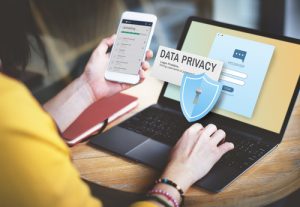Cybersecurity is necessary in today’s digital world. Every day you share information with companies, and everyday hackers work to steal or misuse that data. That is why you want to ensure entities ethically handle data collection.
Data privacy is essential for both individuals and companies. Businesses need to protect their clients. Individuals want to navigate securely online. But what is data privacy, and how can you keep your information secure?
Read on to learn about privacy regulations, and how you can keep your online data protected from cybercriminals.

What is Data Privacy?
Data privacy is the term used to describe your rights and controls over personal data. This control includes how that data is accessed, used, or shared. There are two major types of personal data that you will want to keep safe: Personal Identifiable Information (PII) and Personal Health Information (PIH).
Personally identifiable information includes any of the following information, as outlined by the US Department of Labor:
- Name
- Address
- Social Security Number (SSN)
- Phone number
- Email address
- Gender
- Race
- Birth date
- Geographic indicator
- Financial information (credit card numbers, bank account numbers, etc.)
PIH refers to any data created or received by a healthcare provider related to their healthcare. This data privacy is essential to HIPAA compliance. This could include the following indicators in addition to the indicators listed above:
- Dates related to health
- Fax numbers
- Medical record numbers
- Photographs
- Biometric elements (finger, retinal, voice prints)
- IP addresses
- Website URLs
- Vehicle identifiers
- certificate/license numbers
- Account numbers
- Health insurance beneficiary numbers
Both consumers and companies want to keep sensitive data safe. Many businesses operate using this personal information. Consumers want to strike a balance between sharing their data with certain providers while keeping their sensitive information away from others.
Many websites, applications, and social media platforms collect your personal data and store it to provide you with services. However, if an entity does not practice data security, it can leave the information vulnerable to data breaches, which can compromise your privacy.
Data Privacy for Individuals vs. Companies
When you think about data privacy, there are two perspectives. First, as an individual, you want to preserve your personal data privacy. To do this, you need to choose companies, apps, and websites that prioritize safeguarding your data privacy to keep your information from getting into unauthorized access.
Individuals need to trust companies with their information for them to conduct business together. If you own a business, data privacy is important because you want to protect your intellectual property, employee data, and client information.
You also want users to see your company as a trustworthy service that does not misuse their data. Your business will want to protect consumer data by establishing data privacy policies that explain how you will track, store, and share customer data.
This not only allows you to comply with privacy laws, but it also shows your company’s ethics. Consumer privacy should be a priority for all businesses that provide online services that collect user data, but those in highly sensitive fields such as email clients, social media, medicine, law, and finance should be extra vigilant.

Data Protection Laws
The digital age has brought with it many questions about data storage and data access. As such, there are several laws and regulations that businesses and online entities are supposed to follow to protect your information privacy. These include the following well-known data privacy laws and protections:
- General Data Protection Regulation (GDPR) is a privacy law for your data protection. It was established by the European Union (EU) and the European Economic Area (EEA). This law applies to all enterprises regardless of their location, size, or citizenship of the owner. GDPR regulates how companies process personal data.
- California Consumer Privacy Act (CCPA) demands companies inform consumers about what personal data is collected and ask if this information can be collected. This act also gives consumers more control over how their personal information is used. Many other states such as Virginia, Colorado, and Utah have also passed similar laws in their jurisdiction.
- The Gramm-Leach-Bliley Act (GLBA) is an act that requires financial institutions to let consumers know about their policies and practices for the protection of user confidentiality, security, and integrity. This policy helps to tighten consumer data privacy, safeguards, and restrictions.
- The Computer Fraud and Abuse Act (CFAA) prohibits accessing a computer without authorization.
- Nevada’s Senate Bill 220 helps to prevent businesses from selling customer’s data to third parties. Companies in this bill must provide a toll-free number to opt out of having their data shared.
- Sarbanes-Oxley Act of 2022 (SOX) is a US federal law that protects investors. It mandates that corporations follow certain practices in financial reporting and record-keeping to make sure the records are accurate.
- Payment Card Industry Data Security Standards (PCI-DSS) is a security standard that makes sure credit cards are handled in a secure environment.
These laws and regulations are just the beginning. As increased commerce is conducted online, the need for increased data privacy will lead to more laws and regulations meant to keep your information safe.
The Importance of Data Privacy
There are many reasons why data privacy is important both for individuals and business owners. With increased services being offered online, trust needs to be built between consumers and companies.
#1 Deters Cyber Criminals
Hackers can use your personal data to harass you and commit fraud. If your confidential data falls into the wrong hands, a criminal can drain your financial accounts and damage your personal or business reputation.
Identity theft is not only frustrating, but it can also have severe consequences for your personal and professional life. Financial information is one of the number one targets for cyberattacks, spam, and phishing, so you especially want to be careful about who has your financial data.
In 2022, cybercrime will cost about $8.44 trillion (about $26,000 per person in the US) across the globe. That number is expected to rise in the next few years. These costs affect both companies and individuals. Good data privacy practices help to deter this kind of loss.
#2 Protects Clients
Another problem with poor data privacy is when a company sells your personal data to advertisers or other third-party entities without your consent. This leads to being harassed by marketing and advertising. Data privacy makes sure you are informed about personal data selling instead of being blindsided by it.
Not all data usage is bad. Companies can use data in ways that can lead to advancements in research and technology. However, this research cannot be done if a consumer does not trust a company. Data privacy is about allowing the right people to have your data and keeping it away from the wrong people.
#3 Gives Autonomy to the Client
Data tracking and online activity monitoring can feel repressive. Many online users will be less likely to conduct business freely if they feel their every move is watched. Users need autonomy to control who can track, collect, use, and share their data.
Misusing and exploiting a user’s data without consent takes away this autonomy and creates mistrust.
#4 Shows the Company’s Ethics
One of the most important aspects of data privacy is how it affects clients of a business. A business’s code of ethics refers to its honesty, integrity, and professionalism. A business that is willing to put data privacy as a priority for their company shows a strong code of ethics.
Data privacy is something that affects every layer of a company from the individuals hired to handle that data to the programs and software that use that data. As a business owner, you will want to think about each step along the way to ensure data privacy.
This not only resonates with consumers, but it helps to keep a business out of trouble with the law. It can also be used to establish your branding. The more your customers feel they can trust your company, the more your company will thrive.
#5 Gives You a Plan to Follow
By creating a data privacy plan, a company will know what strategies to implement should there be a data breach. This way, you and your clients know that your data can be recovered if it is lost. Companies with an actionable plan are more trustworthy and better able to bounce back after a data breach
Characteristics of Data Privacy
For companies looking to bolster their data privacy or individuals trying to find companies with the best data privacy policies, there are a few best practices to follow to achieve the best data privacy and protection. The following indicators are what a company should strive to achieve and what an individual should be on the lookout for as they conduct business online:
- Data Loss Prevention (DLP) is a company’s security strategy for preventing data loss, misuse, and unauthorized access. The company uses tools to identify weaknesses in its data storage and works to strengthen those areas. If you are a business, a DLP is essential. As an individual, it is important to understand the DLP plan for any company you share information with.
- Firewalls are a way of monitoring and filtering activity on a network. These firewalls will help to protect unauthorized users from accessing data. The more layers of protection a company or individual has, the better the security.
- Data erasure is when software overwrites digitally stored information with random binary data. This makes your data unrecoverable. Data erasure helps to protect data that is only needed for short-term use by a company. It also fulfills your “right to be forgotten” by the GDPR.
- Data resiliency and data backup are a company’s ability to continue business whether a data breach or natural disaster occurs. So, a company needs to have a strong cloud infrastructure to ensure users that their company can press on even if their main server is down. Backing up data means copying data from one location to another. This helps to store data that the company needs to operate. Backing up data is a way to save personal data that may be lost if a company suffers an unexpected shutdown of its systems.
Data Privacy vs. Data Security
Data privacy refers to the guidelines about how to handle and collect data. This involves the rules, regulations, and best practices available to companies. Individuals looking to find entities that prioritize data privacy can look at these best practices and decide whether the company is trustworthy.
Companies need to take these guidelines and build a data privacy plan that ensures the safety of their client’s personal information. Data security, on the other hand, refers to the tools and controls that entities use to secure your data.
There are many data security tools companies utilize to keep data safe. Firewalls, data encryption, access control systems, and network monitoring are a few important ones to consider. You will want to add these tools to your company’s infrastructure or look for these traits in companies you conduct business with.
Sekur Prioritizes Your Data Privacy
If you are looking for a service provider who can protect your online privacy, Sekur provides Swiss-hosted email, VPN, and instant messaging that keeps your data safe. Our 100% private platform is free from big tech hosting and does not participate in data mining.
With Sekur you can communicate privately and securely with both Sekur and non-Sekur users alike. Our proprietary technology uses a multi-layered 2048-bit encrypted tunnel to make sure all communications are conducted on our secure, Swiss servers only. This means your data is protected by Swiss Privacy Laws.
Start your 7-day trial of Sekur to protect your data
Conclusion
Data privacy is a priority for online users. When you conduct business on the internet, whether as a personal consumer or a company, you want to make sure that your personal and professional data is safe. To ensure the best data privacy, conduct business with reputable sites and entities that follow data privacy laws and regulations.
Make sure to carefully read any notices about data collection or access to give yourself more autonomy over what data is shared and what is not. Then, you can keep your personal information secure.

